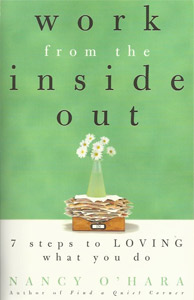Discovery 2:2 – The Second Step: Seeing Clearly & Letting Go
…continued from 7 Steps to Loving What You Do – Discovery 2:1 – Seeing Clearly & Letting Go
Too often we live in the future, especially when it comes to our jobs. We live for the weekend, we can’t wait for vacations, we spend our raises before we get them, we look forward to the day we retire or get a promotion or move to another company. Approaching our jobs with our minds set in fantasy can only bring disappointment. This tendency to project ahead can be insidiously subtle. Sometimes we don’t even know we’re doing it, we only know that we’re experiencing discomfort. This feeling that something isn’t right can run from mild, just-under-the-skin yearning, to extreme anxiety attacks.

It’s Not Always Black & White
One way this tendency manifests itself is in the need-to-know syndrome. From the need to know what our boss is thinking to when our company might re-locate, we believe that the only way to find relief is to learn all we can about whatever it is that haunts us. Often this need to know turns into a lament of “if only.” We convince ourselves that if only we knew what was going on someplace else we’d be happier and better able to do our job. Certainly ignorance of the truth can be a major cause of our pain. But sometimes we get so caught up in delusion that we cannot see the truth. What we think we need to know is usually none of our business.
Many of us have jobs that depend on others. (Before we look at what our ideal job might be we must look at the job we have right now, so be patient.) And sometimes we do need to know when they will complete their task so that we can complete ours. So ask. Nothing wrong with that. It is when we don’t get what we ask for or the answer we want that we stumble and fall off the track and set in motion the destructive cycle of obsession and blame that eventually affects our productivity and disposition. For instance, we might feel that if only we knew when the art department would finish the ad they’re working on, then we could get on with what we’re doing; or if only we knew how much money so-and-so was making, we’d know what kind of raise to ask for; or if only we knew what the company’s relocation plans were, then we could get on with our job without worry—whatever it is, at least we’d know.
Anytime you ask and don’t get the answer you want, your task is to cast away this desire to know and move on, rather than let this craving overtake you and send you into states you’d rather not be in. Move on to something else.
Let go of the need to know. Sit in the not knowing and trust that the truth will reveal itself in time. You will know what you need to know.
In fact, concerning the people and places around you at work you have all the information you need. If you feel it isn’t enough, then it’s time to look at yourself. That’s the hard part. But that’s where true freedom from debilitating thirst comes from.
Keep in mind that it is the inner clinging to the need to know rather than the not knowing that entangles you.
Another way we project ourselves into the future is when we use the phrase “I can’t wait.” This is always followed by a time that hasn’t yet come. I can’t wait for the weekend, until tomorrow, till Christmas comes, till I can get some sleep, to watch TV tonight. On the surface none of this is bad—it’s nice to gleefully anticipate pleasant things. But there’s a big danger in wishing our lives away. Generally, this longing takes us out of the present and puts us in an unreal state, because we cannot know what the future will feel like. It takes us out of the present, which is where we are and the only place we can be. And if we base our idea of the future on our past experience we might be robbing ourselves of some new sensations.
Begin to take notice of the language you use everyday particularly when speaking of the future. Take notice of how this language not only projects you ahead in your mind, but also takes you away from what you’re doing. Ask yourself why you want to be taken away. Ask yourself how good a job you can be doing if you’re not completely present. Each time you hear yourself say something like “I can’t wait,” stop for a moment and look around you. Take notice of your immediate surroundings, of the colors of the walls, the tick of a clock, your co-workers plaid jacket. Center yourself with your breath, pay attention to the task in front of you and know that whatever you can’t wait for will arrive in due time. And when you get there you will be there as fully as you are in this moment.
_________________________________________________
- Write about how important time away from work is and how precious weekends and vacations are. How much time on the job do you spend thinking and dreaming about not being at work? Can you identify why this is?
- Write about some of your recent or recurring need-to-know experiences and where they sent you.
- Observe your language at and around work. Notice how often you use the phrase “if only.” At the end of each day review your interactions with the people you work with. Write about the issues and feelings that arise when you refrain from criticizing others and sit in a state of not knowing.
- Notice how often at work you use a phrase like “I can’t wait.” Each time you catch yourself, jot it down. Collect them all and write about them when you get home. Take note of the events or feelings that immediately preceded each wish to be someplace else. Can you identify a pattern? In using this phrase, in projecting into the future, what is it that you want to get away from? Write about this.
_________________________________________________
Joe worked for twenty years in a retail business. For most of that time he expressed disdain for his work and his employers. He was never happy and planned one day to quit and do something he loved. His true calling eluded him, but he was sure if given the time he’d figure it out. Meanwhile he complained about management (he could do a better job), other employees (he did a better job) and the customers (they were always wanting something and were never grateful). Joe was a smart and capable worker. Conscientious and hard working, he gave much of himself to his job even though he would have preferred not being there at all. In time Joe secured a mid-management position that offered him some freedom to do things his way. But he had no respect for his boss, Pete, and their clashes affected everyone’s morale. All Joe could see was that his boss was an “idiot” and that, if given the choice, employees would choose Joe as a boss rather than Pete.
The tension in the store deepened when one employee was suspected of and then caught stealing significant sums of money. Apparently Pete was not closely involved with the day-to-day running of the store, so much of it fell to Joe. Joe got it from all sides. He felt he had to take action against the corrupt employee even though it wasn’t really his job; he wanted to make changes in the way things were done and never got support from upper management; on top of it all he still hated his work. Joe had a bad back for years, which he blamed on the job. And now his mental and emotional health was being compromised. He suffered a nervous breakdown, though he never called it that, and took some time off from work just after the case against the corrupt employee exploded. After some time away Joe did not want to return to work, and didn’t. But it devastated him to find out that the people at work didn’t want him to return either.
Joe’s answer was to move across the country with his family, far away from everything that reminded him of this experience. But financial pressures sent Joe looking for work before he had a chance to discover what he really wanted. So he ended up in the same business. But this time he got the top job in the store. Misery settled in quickly, though, as Joe found himself doing what he swore he’d never do again—proof that external changes do little to solve internal conflicts. After a year Joe quit his job to try once and for all to find the work that he loved. Joe swears he will never return to the same business and we can all hope for his sake that he keeps his promise. But Joe has a lot of work to do on himself before he will know which path to pursue. It is clear that much of his dissatisfaction came from within and from the storm of confusion generated by “if only,” the need to know, and “I can’t wait.” Joe lived in the possibility of quitting his job and in what was next for him. Because of this, he ruined his health and never even got close to an idea of his dream job. Again, it was his clinging to what wasn’t real rather than the job itself that created so much havoc.
_________________________________________________
Do you identify with any of Joe’s issues and struggles?
If so, what is your version of this story? Write about that.
If not, what do you feel about Joe and his experiences, about the decisions he made? Write about this.
_________________________________________________
During all those years perhaps Joe was afraid that if he looked inside to discover what his dream job was, he’d come up with nothing at all, so he decided not to look. This attitude will solve nothing and will only keep us stuck in delusional fantasy.
The fastest and healthiest way to discover the truth about anything is to live in what is and stay away from the dangerous terrain of what isn’t.
To be continued…
from Work From the Inside Out – 7 Steps to Loving What You Do






you already heard my version of the story. and now…I be here more now. xxoo